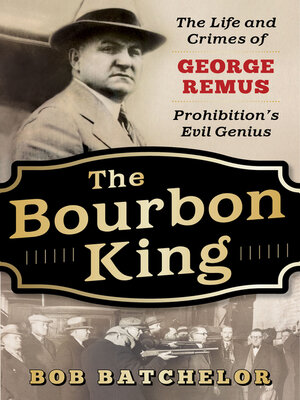The Bourbon King
ebook ∣ The Life and Crimes of George Remus, Prohibition's Evil Genius
By Bob Batchelor

Sign up to save your library
With an OverDrive account, you can save your favorite libraries for at-a-glance information about availability. Find out more about OverDrive accounts.
Find this title in Libby, the library reading app by OverDrive.



Search for a digital library with this title
Title found at these libraries:
| Library Name | Distance |
|---|---|
| Loading... |
The rise and fall of the man who cracked Prohibition to become one of the world’s richest criminal masterminds—and helped inspire The Great Gatsby.
Love, murder, political intrigue, mountains of cash, and rivers of bourbon…The tale of George Remus is a grand spectacle and a lens into the dark heart of Prohibition. Yes, Congress gave teeth to Prohibition in October, 1919, but the law didn’t stop George Remus from amassing a fortune that would be worth billions of dollars today. As one Jazz Age journalist put it, “Remus was to bootlegging what Rockefeller was to oil.”
Author Bob Batchelor breathes life into the largest bootlegging operation in America—greater than that of Al Capone—and a man considered the best criminal defense lawyer of his era. Remus bought an empire of distilleries on Kentucky’s “Bourbon Trail” and used his other profession, as a pharmacist, to profit off legal loopholes. He spent millions bribing officials in the Harding Administration, and he created a roaring lifestyle that epitomized the Jazz Age over which he ruled.
That is, before he came crashing down in one of the most sensational murder cases in American history: a cheating wife, the G-man who seduced her and put Remus in jail, and the plunder of a Bourbon Empire. Remus murdered his wife in cold-blood and then shocked a nation winning his freedom based on a condition he invented—temporary maniacal insanity.
“The fantastic story of George Remus makes the rest of the “Roaring Twenties” look like the “Boring Twenties” in comparison.” ―David Pietrusza, author of 1920: The Year of the Six Presidents







